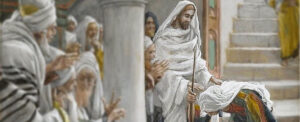Sermon for Sunday, November 27, 2022.
Ephesians 2:14-22; Luke 10:25-37
Glory to God the Father, the Son, and the Holy Spirit. Amen.
In 1859 Benjamin Jowett, Professor of Greek at Oxford, published a famous essay on the interpretation of Scripture. Jowett argued that “Scripture has one meaning – the meaning which it had in the mind of the Prophet or Evangelist who first uttered or wrote, to the hearers or readers who first received it.” To him, Scripture should be interpreted like any other book and the later ideas and beloved traditions surrounding its interpretation should either be brushed aside or severely discounted.
“The true use of interpretation is to get rid of interpretation, and leave us alone in company with the author,” he said.
This is a job easier said than done! Within five minutes’ walk of us at this moment are half a dozen congregations, gathered right now to open the Bible and meet Jesus as they understand him. And every one of them believes they are reading the Bible in its obvious, clear sense, unburdened by traditions of men. And yet all our gospels are so different.
On one hand we have the Scriptures saying blunt things like, “Unless you eat the flesh of the Son of Man and drink His blood, you have no life in yourselves” (John 6:53) and “Baptism now saves us” (1 Peter 3:21) and “Hail, Mary, full of grace! The Lord is with thee!” (Luke 1:28) and “Unto us a son is given: Wonderful, Counsellor, The mighty God, The everlasting Father, The Prince of Peace,” (Isaiah 9:6) and “If your eye causes you to sin, tear it out and throw it away. It is better for you to enter life with one eye than with two eyes to be thrown into the fire of Gehenna” (Matthew 18:8-9).
And on the other hand, we have this same Benjamin Jowett, reading the same Bible (he would insist) without any outside tradition, and concluding that Jesus was merely a human “teacher… speaking to a group of serious, but not highly educated, working men, attempting to inculcate in them a loftier and sweeter morality.”
Today in our Gospel reading I would like to put into action a much more ancient, classic Christian way of reading the Bible.
You’ve heard the quote that “The letter kills but the spirit makes alive” (2 Corinthians 3:6). But you may not know that from the very beginning, Christians have read the Bible, not just on two levels, literal and metaphorical, but in a much more thoughtful way.
There’s a little Latin rhyme that translates to:
Quid credas allegoria,
Moralis quid agas,
Quo tendas anagogia.
The letter teaches what happened,
The allegorical sense teaches what you believe.
The moral sense teaches what you should do,
The anagogical sense teaches where you are going.
This morning we read the Gospel passage about the Good Samaritan, and I’d like to put these classic Christian tools to work.
The letter is always the place to start. And in this one specific place, Benjamin Jowett is not wrong: What did the speaker mean? Who was he talking to? And what did they understand him to mean?
Now biblical archeology and Ancient Near-East Studies may give us delusions of telepathy so that we become convinced we know what the hearers thought and felt. These sciences and speculations have their limits, and frankly that fact leads some Evangelical teachers to despair: Is the real teaching of Jesus so removed from us that we can only ever encounter them in biased translation from a foreign language – and we have to rely on the smudged, dark mirror of anthropology and archeology in order to assemble a plausible, reconstructed Jesus?
That epistemic darkness was what prepared me to be brought face-to-face with the apostolic Tradition. Encountering how the early Christians believed, worshipped, and worked out the Gospel of the Kingdom, in their own words, was a light of revelation to the Gentiles that let me know how far I was from the Faith of the Apostles – and it was a lighthouse that led me home.
So even though there’s value in archeology, let’s not spend too much time on it, because today the letter of the text has some things to teach us that don’t need any reconstructing.
For a starter: What is a Samaritan?
From scripture we know that when the Hebrews settled in the Promised Land, the Lord assigned each of the twelve tribes a place to live. The tribe of Judah settled around the city of Jerusalem, in the south. The tribe of Levi, the priests and deacons, didn't get a territory, since their whole assignment was the sacrifice and singing at the temple; the other tribes supported them with their tithes. The other ten tribes of Israel settled in the north, and after King Solomon they formed a kingdom of Israel, separate from Judah in the south. Then about 700 years before Christ, the Assyrian empire conquered Israel and deported its leaders and wealthy people. In their place, the Assyrians settled pagan foreigners from all over the Near East, so that the kingdom of Israel could never again unite and oppose them. These newcomers intermarried with the remaining Israelites and developed their own variety of religion, their own holy mountain, and their own new identity as the Samaritans.
Now, by the time of the Lord's incarnation in Judea, this was all 700 years in the past. Our own country was founded just 246 years ago; so try to imagine how ancient and unchanging this alienation was: The Samaritans have always been the heretics, the halfbreeds, the others.
My Dad was a product of his upbringing here in the inland northwest in the 1950s, and God bless him, he never had a kind word for Mexican folks. Most of us know someone who has racist habits of thinking or speaking. That level of conscious and unconscious animosity marked relations between Judeans and Samaritans. “‘You are a Jew and I am a Samaritan woman. How can you ask me for a drink?’ For Jews do not associate with Samaritans” (John 4:9). It’s because of today’s parable that we now have the expression “Good Samaritan,” but in that time and place you’d never have heard a Samaritan called good.
* * *
Our passage in the Gospel began with a teacher of the Jewish law asking, “What shall I do in order to receive the Life of eternity?” (Luke 10:25). The next verse deserves a sermon of its own: This teacher says he’s been taught “Thou shalt love the Lord thy God with all thy heart, and with all thy soul, and with all thy strength, and with all thy mind; and thy neighbor as thyself”(Deuteronomy 5:5; Leviticus 19:18). And the Lord adds, “Do this and you will live.”
I wonder what was on the teacher’s mind when he probed further and followed up: “And who is my neighbor?” What are the boundaries, beyond which I don’t need to do mercy? Who is not my neighbor? It was this teacher who mentioned neighbors in the first place. But now the Lord is going to take advantage of this opportunity to point out among other things the sin of racism, since the only good example in his parable is going to be a Samaritan. Not a holy priest or Levite, but a man you wouldn’t want in your house, or even talk to if you could help it. This parable scandalizes the hearers by overstepping boundaries.
So the Lord tells his parable: A man going up from Jericho to Jerusalem is robbed and almost killed; two men of God cross the street to avoid him, but a Samaritan stops, washes and bandages his wounds, and pays for his recovery in a hotel. So who was the wounded man’s neighbor, asks the Lord? The one who showed mercy. Well, go do that.
In today’s reading we don’t have to look far to find the moral sense, the second layer of Bible reading. Most obviously: When you encounter need, respond with acts of mercy.
Incidentally, don’t be too hard on the priest and Levite in this account. They’re on their way up to Jerusalem to serve their day at the Temple. Remember last week’s Gospel? The woman with the issue of blood was untouchable. Touching blood or dead bodies made a person ritually impure so that they couldn’t enter the Temple. The priest and Levite here are following the Law. They’re keeping a promise, fulfilling their obligation.
But the Lord says in another place, “Woe to you, scribes and Pharisees, hypocrites! For ye pay tithes of mint and dill and cumin” – you tithe even on your kitchen herbs – “yet you have omitted the weightier matters of the law: justice, mercy, and faith. These ye ought to have done, and not to leave the other undone” (Matthew 23:23).
The priest and Levite in this parable give us a rule of thumb that might be useful. Ask yourself: what has eternal value? If someone needs mercy – they need someone to cry with for a little while, or a housebound person needs someone to make a grocery run, or their WiFi is messed up and they can’t get it running, then stop a second and decide whether what you have scheduled matters more. Maybe it does. If I’m that priest, and I’m going to be serving the Liturgy at 9:00, and at 8:00 somebody needs help, it would take a pretty major emergency to make me leave a church full of people disappointed – though I’ve done it. But often with a moment’s perspective we can decide to be late to something, accept some embarrassment at a promise delayed, or just cancel something we meant to do, in order to “Go and do likewise” to the person who needs mercy right now.
How many times have we seen moms do that on Sunday morning? Some small person is melting down or throwing up, so Mom makes the decision to stay home from the Liturgy and serve them. She’s giving up spiritual refreshing (and grown-up time) to do costly mercy.
Incidentally, that person you haven’t seen in church for a week or two might be the one lying beat-up on the way, and in need of a Samaritan to stop, come over and show mercy. Or just have a grown-up conversation.
* * *
While we’re looking at the letter of the reading: We need to ask what came before this text, and what comes after? We’re almost always reading the middle of a chapter or the middle of a conversation.
Luke begins chapter 10 with the Lord sending out the seventy Apostles. “He sent them two by two before his face into every city and place, where he himself was about to go… into whatsoever house ye enter, first give Peace to the house… And heal the sick, and say to them: The kingdom of God is come nigh unto you” (Luke 10:1-9). Then he goes on to lament the destruction of people who won’t receive the Gospel of the Kingdom (v. 10-16). Finally, when the seventy apostles return, the Lord rejoices that the Father has revealed such wonders to them. “For I tell you, that many prophets and kings have desired to see those things which you see, and have not seen them; and to hear those things which you hear, and have not heard them” (v. 24).
Now as the Lord is, evidently publicly, welcoming back his apostles who have been preaching the Kingdom of God, “Behold, a certain teacher of the Law stood up, and tempted him, saying, ‘Master, what shall I do to inherit the Life of eternity?’” (v. 25). How do I live the life of the age to come?
The Lord is not segueing away from the theme of the Kingdom of God invading the here-and-now when he turns to the Good Samaritan. This parable is Christ’s answer to How do I live the life of the age to come?
And what comes next? Immediately afterward, in verse 39 we’re with Mary and Martha at Lazarus’s house in Bethany. Martha is busy, doing all the things, and Mary “has chosen the good part,” sitting at Jesus’s feet, and what she receives there “will not be taken from her” (Luke 10:39-42).
I don’t think I am forcing a parallel when I see Saint Luke’s choice to put the Mary and Martha account immediately after the Good Samaritan. Both are about choosing the thing that matters for eternity over the merely urgent.
Urgent things cry out for action right now. But they’re not always important. That is, in a day or a week or a year, how thankful or regretful will you and your family be if this thing does or doesn’t get done?
If your house is on fire, that’s both important and urgent. If your power bill is due on Thursday, that’s definitely important – but it may not rise to the top of things that just have to be done today; it isn’t urgent. If one of the kids can’t find his blanket, he may try to convince you it’s urgent, but you might not choose to call that very important. And the guy on the phone who wants to talk to you about your car’s extended warranty? Tell him his call is neither urgent nor important.
“For we are his workmanship, created in Christ Jesus for good works, which God prepared beforehand, that we should walk in them” (Ephesians 2:10). Both in worldly common sense and in the laws of the Kingdom of God, we need to intentionally practice watchfulness in order not to let urgencies blind us to opportunities to do justly, love mercy, and walk humbly with our God (Micah 6:8).
* * *
While reading the letter and the moral of the text, we have incidentally crossed into the anagogical reading of Scripture: That’s fancy talk for “it leads you upward” and it’s how our reading relates to the Kingdom of God.
Mercy and justice aren’t religious vocabulary, they are ways that we are commanded to act. The Lord is coming to judge the earth; more specifically, to judge us for the things we have done. And if we are living by the laws of the Kingdom, then we’re meant to be the people who live mercy and peace, a sacrifice of praise.
When a co-worker is stressed or in fear, who does he seek out? Is your desk a place of peace where he knows he has never heard a scornful or demeaning word spoken against anyone? When a customer or a patient is melting down from frustration, are you the one who gets thrown under the bus to deal with them, because people know you’re someone who does patience and kindness? Your kids know perfectly well you’re not a saint – but do they know from experience that they can confess their own mistakes and you’ll always have their backs?
In Kingdom-of-God terms, if we’re coming from “How can I live the life of the age to come here and now,” and we’re going to “Go and do likewise,” the take-away is to be watchful for the opportunities God will put in front of you to do mercy – with a word or a touch, or with a costly decision.
We’ve touched on the literal, the moral, and the anagogical “lead you upward” lenses for viewing scripture. The last one is where we have the potential to get weird. Allegory.
Allegory does not suggest the literal events didn’t happen, but it asks what we’re supposed to learn from them. In 2000 years of the Fathers’ writings, some allegorical teachings have proven to be helpful and some have not. An early writer named Origen read Leviticus and wrote that it would be silly to think that in the Jewish dietary laws the Lord meant to forbid eating actual pigs and bugs. God doesn’t care what you eat; obviously God meant not to associate with swinish people, of low and creeping character.
It’s smart to be suspicious of teachers who read the Bible and say “This means that” on their own authority. Saint Basil addressed people who turn the Bible into a library of metaphors:
I know the laws of allegory, though less by myself than from the works of others. There are those truly, who do not admit the common sense of the Scriptures, for whom water is not water, but some other nature, who see in a plant, in a fish, what their fancy wishes, who change the nature of reptiles and of wild beasts to suit their allegories, like the interpreters of dreams who explain visions in sleep to make them serve their own ends. For me grass is grass; plant, fish, wild beast, domestic animal, I take all in the literal sense. “For I am not ashamed of the Gospel”[Romans 1:16] (From Homily 19:1).
But some historical biblical texts have given the Church the vocabulary to teach true things using the text. Here is how Saint Augustine put today’s Gospel reading to use:
The traveler is going up from Jericho – that ancient pagan city, which stands for the World, and going up to Jerusalem, the city of God. Everyone is walking that road, either to the judgment of eternal fire or to the wedding supper of the Lamb of God. On the way, they are attacked by the passions, wounded, left to die.
It’s the Lord himself who stops and has mercy on the one who is suffering. On his wounds, the Lord pours oil and wine – grace, in the sacraments – and he binds up his wounds. He bears the suffering man on his own animal, as the Lord carries our suffering in his own body to the cross.
And the Lord brings the wounded man to the inn – the Church. He says “Care for him,” and to the innkeeper he gives two coins, the Law and the Prophets, and tells the innkeeper to use these to care for him and make him well “until I return.”
Here’s what interests me about Augustine’s reading of the parable: You and I have heard plenty of sermons saying, “Be like the Samaritan, be merciful.” And that’s absolutely what Christ was telling the teacher of the Law. That’s the moral teaching of the parable. But Augustine, looking at the community of the Church, puts the emphasis on the traveler, being saved by Christ; and on the innkeeper’s calling to care for the traveler and heal him.
About the innkeeper: “Hotel” and “Hospital” come from the same Latin word – it means a place of care for the poor and weak. Most of us have heard Saint John Chrysostom’s sermon that “The Church is not a courtroom for souls but a hospital. She does not condemn sinners, but grants remission of sins… In the Church, the joyful sustain their joy. In the Church, those worried acquire merriment, and those saddened find joy. In the Church, the troubled find relief, and the heavy-laden find rest.”
Into contact with the Church the Lord brings families and individuals who are beat up, they’ve been burned by religious authorities and by the people who were supposed to help them. Their own compulsions and the lies they’ve been told have left them for dead. And the Lord leads them to encounter our community. Either they come to a service, or they have contact with a member who shows some interest, makes eye contact, and crosses boundaries to do kindness to them.
And the Lord says to you and me, “Take care of them till I return, and I’ll reward you.”
But wait, I hear you say: We’re the Church. But aren’t we also the ones on the road, in need of the grace of the sacraments to bind up our wounds and cleanse our sins, and taking refuge in the safety of the Church?
We’re that, too. It’s not a perfect allegory; every metaphor breaks if you put too much weight on it.
But that’s what the Church is, isn’t it? We’re here in the hospital for souls, bringing our grief and our history, and the sins that so easily entangle us, and receiving grace and life and rest for our souls. And we’re the servants at the feast, to whom the Lord says, “Bring a robe, and put a ring on his hand, and bring the fatted calf and prepare it! For my child has come home!” (CITE).
What the Lord has done in today’s parable is to bring down the nice, comfortable sentiment “Love God and love your neighbor” down into our experience, where it’s got mud and blood and bruises on it.
And you know I do love me a good theological sermon full of patristic quotes and ineffable noetic hesychastic hypotenuses — but today the Lord preached a sermon with a moral, and that’s where we need to land today: Practice watchfulness to see when the Lord has set you up to do mercy to someone. And go ahead and cross boundaries, talk to someone strange and untouchable, mess up your day’s schedule, to make a human contact face-to-face with someone who needs some mercy. You don’t need a systematic theology for that; you just need a heart.
To the glory of God the Father, the Son, and the Holy Spirit. Amen.







